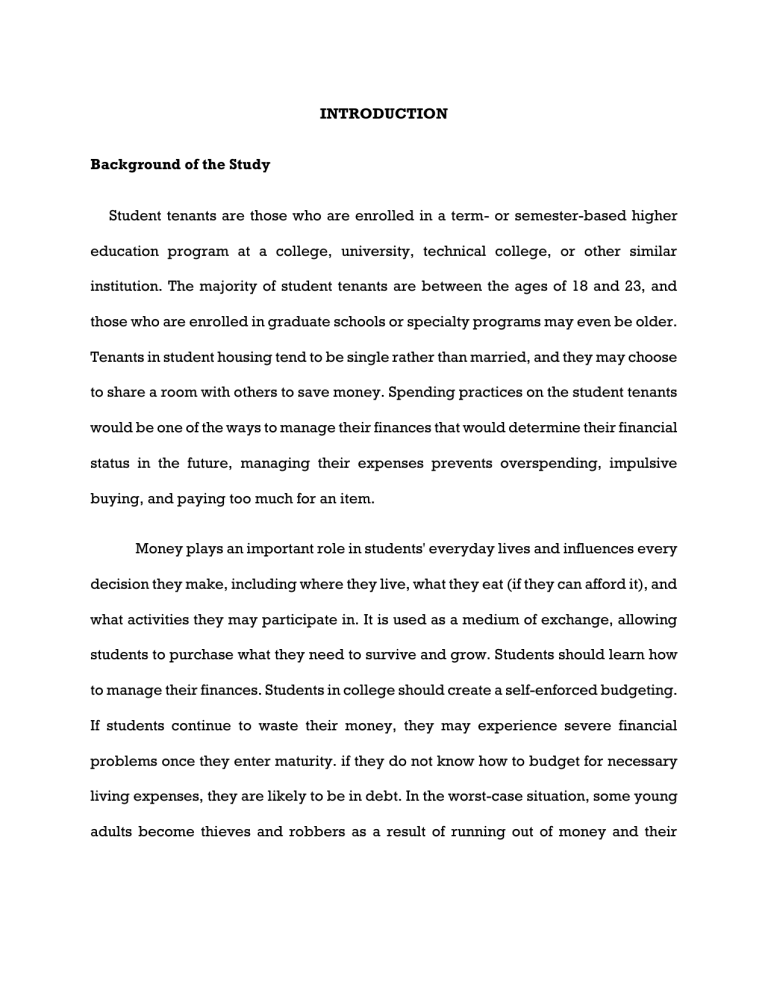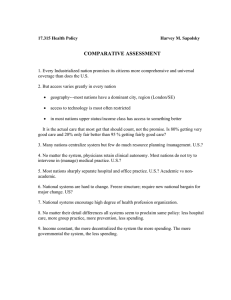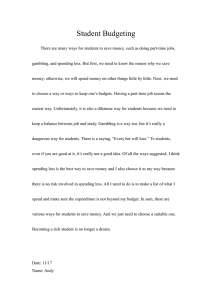
INTRODUCTION Background of the Study Student tenants are those who are enrolled in a term- or semester-based higher education program at a college, university, technical college, or other similar institution. The majority of student tenants are between the ages of 18 and 23, and those who are enrolled in graduate schools or specialty programs may even be older. Tenants in student housing tend to be single rather than married, and they may choose to share a room with others to save money. Spending practices on the student tenants would be one of the ways to manage their finances that would determine their financial status in the future, managing their expenses prevents overspending, impulsive buying, and paying too much for an item. Money plays an important role in students' everyday lives and influences every decision they make, including where they live, what they eat (if they can afford it), and what activities they may participate in. It is used as a medium of exchange, allowing students to purchase what they need to survive and grow. Students should learn how to manage their finances. Students in college should create a self-enforced budgeting. If students continue to waste their money, they may experience severe financial problems once they enter maturity. if they do not know how to budget for necessary living expenses, they are likely to be in debt. In the worst-case situation, some young adults become thieves and robbers as a result of running out of money and their families are not able to provide for them financially. They must learn how to establish budgeting and how they will spend their money over the period of a week or month. According to J.T.C. Buna's (2018) study titled "Factors Affecting the Spending Behavior of College Students," found that parents play a significant role in shaping children's financial behavior and money management skills as well as their basic attitudes toward life. College students' expenditures have a significant influence on their behavior. For young people to have the best chance of success as adults, it is crucial that they begin learning about finance during their academic year. Having even a basic understanding of finance is insufficient. Success requires a strong, optimistic outlook, as well as parents who model and implement smart financial behavior. Every student must understand the importance of managing money in order to prevent relying on their parents. Budgeting serves as the most effective tool for managing personal finances since it allows you to achieve further by spending your money in a specific manner. Budgeting comprises devising a strategy for covering expenses, whereas spending entails using money to meet needs and wants, such as education. That is why the purpose of this research is to provide some ideas concerning spending practices. Every student must learn how and where to spend money properly. Students are unaware of the importance of money throughout their college years and occasionally overspend therefore, it is essential to manage finances properly. Being a student demands good money management considering the allowance will most likely keep you there for the entire month. According to Nick L. Aduana (2017, p.308), most successful people share one trait: they manage their finances properly through effective planning. Personal Financial Planning processes include the following steps: 1) conducting personal finance planning, 2) setting goals and objectives, 3) preparing a financial budgeting planner, 4) carrying out financial transactions, and 5) monitoring and evaluation. This procedure supports an individual in monitoring and balancing his or her finances. Parents should teach their children how to save their own money for future needs so that they will not rely on their parent's money and it may rely solely on their savings and income in the future. When it comes to financial problems, one of the most prevalent indications is that you spend more than they earn. They frequently spend more than they receive, especially for those who are living away from family for the first time and experiencing independence. They have little or no idea how to manage their budget, and they will spend their money without thinking about it, resulting in difficulties such as not having enough money to buy what they needed. They lack knowledge about how they should manage their money. When college students are experiencing financial difficulties, they are anxious and find it difficult to focus on the lesson. This will have an impact on their academic performance, including scores and performance, as well as their future opportunities. The most challenging problem that students encounter is the inability to budget their expenses and save a proportionate amount each month for unexpected circumstances. Most of the time, particularly here in the Philippines, it is the parents who pay for their children's education. Student budgeting is the managing of one's financial expenses within the constraints of a budget. Several elements contribute to students' dynamic and distinct conduct. These elements might be both technological and psychological, in addition to being controlled or uncontrollable. In some circumstances, those from wealthy families are more likely to submit outputs or projects ahead of time since they have adequate or even a larger budget for such activities. While some people who are financially stressed tend to submit later as a result of such challenges. (Last of intro) Keyword : Money, Budgeting, Spending, Personal Finance, Money Management Expenditure, Expenses, Student Tenants This study will give a quick overview on how students manage and spend their allowances. The results will benefit students, as well as teachers and other faculty members of Panpacific University. Similarly, the goal of the research is to assess how well the student manages their monthly allowance. To the Researcher - This study will help the researchers in learning how to manage their finances for future goals and the dos and don'ts of money expenditure. To the Student - The outcomes of this research will be helpful to students in understanding how to properly manage their allowance and reduce their expenses. To the Parents - This study will assist the students' guardians or parents in teaching the students how to manage their own finances so they won't be dependent on their means. It will assist the parents in guiding their own child in balancing their financial necessities and wants. The way that people view money has evolved for the past decades, and today's students are growing up within society. Students are now using credit and credit cards instead of preparing money for emergencies and for the necessities. cards to cover these expenses and even to pay normal everyday bills! Staying out of debt is no longer valued as an important social norm. In fact, the debt-free lifestyle sought after by prior generations has been replaced with simply “paying bills on time” and in many cases “only making minimum payments” (Diamond & O’Curry, 2013). Students who think before they buy are more likely to spend wisely, whereas those who do not are more likely to waste money. Student Tenants spending practices can be improved if they prepare their expenses ahead of time. They should think about saving for "needs" rather than spending on "wants." The student appears to spend a lot of money on entertainment, therefore they should figure out how to control it. This study was conducted to examine the financial and psychological components of spending control strategies and provided genuine findings, however it was not included in its scope. start Student tenants currently constitute a sizable and growing population. They are a subset of the population who have reasonably well-defined housing needs which set them different from the majority of the students at their age. Aside from a few studies on specific cities or regions, minimal research has been conducted on the subject of student accommodation. The building environment provides conditions that affect students' educational experiences. Student accommodation has long been seen as an essential component supplied by higher education institutions to support learners in expanding their intellectual skills. Aside from learning various courses and enduring arduous course loads, students reach the point of experiencing independence from home, particularly those whose residence is located far from the college or university where they enrolled. While living away from home has advantages. It is also a source of fresh experiences considered a risky endeavor. The theoretical framework for this study is supported by the economic theory called the life-cycle hypothesis which analyzes how people spend and save money over the course of a lifetime. According to the theory, people try to balance their lifetime consumption by borrowing during times of low income and saving during times of high income, meaning understanding your income and outgoings and evaluating your spending habits is the first step toward achieving any financial objective. The system of mental budgeting is used by planned spending practices, and student tenants allocate their funds to various mental accounts in order to resist any additional costs and can support themselves in controlling their spending on unnecessary items. On the other hand, unplanned spending occurs when someone does not have a list of necessary purchases such as a medical emergency. As a result, student tenants must learn to buy everything they need even if it's not on the list in order to visit the mall or a few stores only once. Student tenants may experience unexpected expenses for a variety of reasons, including the fact that they unexpectedly forgot to buy particular items despite having a routine for shopping every time. Second, while shopping, the customer can get some new ideas. Since many student tenants spend excessive amounts of money on the things they enjoy the most without realizing what would occur when their entire budget has been spent, some spending is referred to as compulsive spending. Due to excessive spending on unnecessary items, compulsive spending is a behavior that lacks selfcontrol. Student Tenants inadvertently engage in compulsive spending because they believe that everything they buy is important and that they are in control of their spending. Students who spend money on a daily basis should take responsibility for how much they spend. They should remember how to budget their allowance, or better yet, they should be careful enough to help their parents in some way. They should be aware of themselves. Students are provided allowances for a variety of reasons, including board rent, education, additional school fees, commodities, and meals. This conceptual framework depicts the relationships between the independent and dependent variables. The study's conclusion is determined by the relevant factors. It comprises the student tenants' spending practices and the factors they used to discover their spending practices. The conclusions of the study are the dependent variables. It comprises the following steps to be followed in order to improve the spending management practices of the student tenants at Panpacific University. Leave for table The main objective of this research is to identify the Spending Practices of the Student Tenants of Panpacific University. The data collected through the use of google form survey with the consent of the respondents. The researchers survey thru sending google form link via gmail to dig deeper into the responses obtained, and at the same time analyzing their responses, which helps to prepare a relevant market report. The researcher will evaluate the Student Tenants on their knowledge about the proper way of spending their Monthly allowance. The researcher wants to know about the factors affecting the spending pattern, and also the level of spending management practice of student tenants in Panpacific University. Additionally, the researcher is seeking information about potential financial management strategies for students and ways they might cut back on unnecessary spending or the remediation can be implemented to address the issue. The main objective of our study is to examine proactive engagement plans on proper spending and budgeting of student tenants. With the given solution, it will help and give them an idea on how they can minimize their allowance expenditure in their daily life. They must have proper knowledge, guidance to budgeting and spending. It’s important to know whether the student allowances are being used properly to cover their weekly or monthly expenses. This positive attitude will help them to practice proper spending and budgeting behavior concerning financial management as working adults in their future. Research Hypothesis There is a relationship between the level of spending practices and the factors affecting the Student Tenants at the Panpacific University AY:2022-2023. Statement of the Problem The main problem of this study is to determine the spending practices of student tenants in Panpacific University. Specifically, the researchers sought to answer the following questions: 1. Profiling churva 2. What are the levels and factors affecting the spending practices of Student Tenants in Panpacific University? 3. Is there a difference between the profiles and levels and factors affecting the spending practices of student tenants? 4. What solution can be implemented to address the student tenants' spending practices? METHODOLOGY This chapter describes the instruments and procedures used in collecting data, as well as the number of respondents who took part in this study. The notion of methodology is an assessment produced with the aim of determining the research question it discusses through population and locale, data gathering instruments, data gathering procedures, and treatment of data. This study is essential. It provides additional information to those who will benefit from this study. Research Design This study uses Quantitative Research in a type of Descriptive-Correlational. According to Mcburney and White, 2009 In research investigations, descriptive correlational design is utilized to determine the connection between various variables and produce static images of situations. In order to describe the characteristics of the population or research issue, the researcher engaged in a descriptive analysis. The researchers observed and described the respondent's behavior with regard to their spending management practice using the descriptive research approach. Developing effective spending management decisions can be facilitated by doing research using correlational studies. Learning how to construct a correlational analysis may assist us in discovering possible relationships between various elements of this research study. The study adopted a descriptive approach by utilizing a wide range of subjects and questionnaires to fully understand the condition, the descriptive method aims to describe and explain the current situation of the students' tenants. It is a study designed to exemplify the participants in an accurate way. More clearly explain. Descriptive research is all about describing people who take part in the study. Locale and Population Researchers chose to conduct this study at the Panpacific University, located at MacArthur Highway, Urdaneta City. Many nearby boarding houses are located in this area; typically, students from Panpacific University are the tenants of some of the boarding houses. The researcher chose this location because the researchers are familiar with several of the student tenants in this area and it fits the time frame and resources needed by the researcher. Having this location of our study we are able to provide the maximum number of student tenants. The respondent of this study are more than 100 Student Tenants, randomly selected students of Panpacific University, the majority of our respondents is under the criminology and marine transportation student tenants, the sampling method that we used in this study is “Simple Random Sampling Method” meaning Simple random sampling is a fundamental sampling technique that is easily integrated into more advanced sampling techniques. Every student has a chance of being our respondent, which is the key characteristic of this sampling method, simple random sampling is one of the best probability sampling methods that we can use. Getting data from a sample is more advisable and practical. DATA GATHERING INSTRUMENT A questionnaire was utilized as the tool for collecting data thru google form, as it gathers data more quickly than other approaches. The respondents were easily able to read and respond to the questioner. The questionnaire was formulated by the researchers and has undergone validity and reliability testing. All the questions in the questionnaire are sufficient to gather information or data relevant to the study and at the same time the questioner is absolutely neutral and not biased. The responses, comments, and suggestions of the respondents were considered. The validity of the said instrument's data will be determined through the evaluation of experts whose fields of specialization are related to the subject matter of the study. Using a research - made validation instrument, the experts determined the instrument's validity. This questionnaire is all about Spending Management Practices of Student Tenants in Panpacific University, It content, level of spending practices, factor affecting the spending practise and also trend of spending management practices of student tenants, the instrument that we used is likert scale, the fundamental benefits of likert scale is that they utilize a common form of data collection, making them simple to understand, when working with quantitative data, it is easy to analyze from the respondent and generate reports, result, and also graph. Weighted mean we used this instrument to calculate the average value of data. And also percentage to be able to know how many of the participants gave a particular answer. DATA GATHERING PROCEDURES Data gathering procedure is done after the questionnaire was created and validated, the researcher made as many copies of it as were necessary to fit every respondent while also preparing a letter of request for the superintendent of the school division and the heads of the concerned schools, this letter containing a permit to conduct a study of the assigned area. the researcher will ask for permission to gather some information about the spend management practice among the student tenants of panpacific university. The researchers personally delivered the letter of request and copies of the questionnaire to the respective school. The researcher provided the details to assist the respondents complete the questioner when delivering the letter and copies of the instrument. The surveys were obtained the same day they were completed. The outcomes of the retrieved questionnaire copies were tallied, and the data also were analyzed and translated using the best suitable statistical method. ETHICAL CONSIDERATIONS The researchers took a few other ethical factors into account while conducting the study. The researchers assured the study participants that all personal information would be kept strictly confidential during the study. This is done to protect the privacy of the participants in the study as well as to give them a sense of security. To safeguard the confidentiality of the study participants, the researchers used pseudonyms to replace their names. All raw data was meticulously collated and recorded by the researchers. The raw data, results, methodology, and procedures were acquired and organized in their original form. This is done in order to provide the research with honest, unvarnished results. The respondents expressed their approval to engage in the study, which was conducted together with their participation. This was accomplished by sending a letter of consent to the letter's subjects by email. The researchers also gave the participants a full explanation of the research's purpose in transparent, basic language that they could understand. Additionally, the researchers didn't threaten or compel the students into participating in the study in any way. Likewise, respondents were informed that they might withdraw from the study at any moment if they so desired. They can choose to participate in and contribute to the research. TREATMENT OF DATA SOP 1: Weighted Mean - is computed to get the average mean or central value of the respondent in every statement using this formula. Formula : 𝑥= 𝑥𝑥𝑥 𝑥𝑥 Where ; 𝑥 - is mean x - is measurement or value w - is number of measurement SOP 2: Percentage - this will employ to determine the frequency account and percentage distribution of personal related variable of the respondents 𝑥 Formula : % = 𝑥 × 100 Where: % - is the percentage F - is the frequency N - is the total number of respondent 100 - is the constant value SOP 3: ANOVA - The ANOVA test is a development of the t- and z-tests, which were created earlier in the twentieth century. It is a statistical analysis method that divides observed aggregate variability within a data set into two parts: systematic components and random factors. Random factors have no statistical influence on the supplied data set, whereas systemic factors do. Formula : where: F=ANOVA coefficient MST=Mean sum of squares due to treatment MSE=Mean sum of squares due to error References APA 6TH 2010 EDITION BAKA NAMAN PO ALLEN https://psa.gov.ph/sites/default/files/Session%201-4%20Intertemporal%20LifeCycle%20Theory%20of%20Consumption.pdf https://rentprep.com/blog/tenant-screening-news/renting-college-students/ https://www.academia.edu/43366282/RESEARCH_WORK Stilley, K. M., Inman, J. J., & Wakefield, K. L. (2010). Spending on the Fly: Mental Budgets, Promotions, and Spending Behavior. Journal of Marketing. https://doi.org/10.1509/jmkg.74.3.034 Bona, J. (2017). Spending Behavior among College students. Sci.Int. (Lahore),29(4),749- 753 ,2017 ISSN 1013-5316;CODEN: SINTE 8 . Komal, Yadav and Mehta, 2017. Money Management Practices among Students. IRACST – International Journal of Commerce, Business and Management (IJCBM), ISSN: 2319–2828 Vol. 6, No.1 Jan- Feb 2017. Retrieved at Bona, J. (2017). Spending Behavior among College students. Sci.Int. (Lahore),29(4),749- 753 ,2017 ISSN 1013-5316;CODEN: SINTE 8 . Factors Influencing Online Buying Behavior of College Students: A Qualitative Analysis (researchgate.net) Factors influencing online buying behavior of college students. (n.d.). Retrieved February 2, 2023, from https://www.researchgate.net/profile/MonicaKhanna/publication/290496753_Factors_Influencing_Online_Buying_Behavior_of_C ollege_Students_A_Qualitative_Analysis/links/56f4f7a608ae81582bf0afce/FactorsInfluencing-Online-Buying-Behavior-of-College-Students-A-Qualitative-Analysis.pdf



